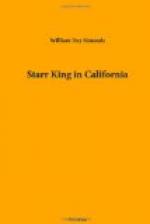A bread-winner at fifteen, and for a large family, surely this is the end of all dreams of scholarship or of professional service. That depends on the man — and the conditions that surround him. Happily King’s mother was a woman of good mind who knew and loved the best in literature. Ambitious for her gifted son, she read with him, and for him, certain of the masters whom to know well is to possess the foundations of true culture. It is a pretty scene and suggestive — the lad and his mother, reading together “till the wee small hours” Plutarch, Grote’s History of Greece, Bullfinch’s Mythology, Dante and the plays of William Shakespeare. Fortunately his mother was not his only helper. Near at hand was Theodore Parker who was said to possess the best private library in Boston, and whose passion for aiding young men was well known. He befriended King as he befriended others, and early discovered in the widow’s son superior talents. In those days very young men used to preach. Before he had reached his majority, King was often sent to fill engagements under direction and at the suggestion of Parker. The high esteem of the elder for the younger man is attested by the following letter to an important church not far from Boston.
“I cannot come to preach for you as I would like, but with your kind permission I will send Thomas Starr King. This young man is not a regularly ordained preacher, but he has the grace of God in his heart, and the gift of tongues. He is a rare sweet spirit and I know that after you have met with him you will thank me for sending him to you.”
This young dry-goods clerk, schoolmaster, and bookkeeper, for he followed all of these occupations during the years in which he was growing out of youth into manhood, was especially interested in metaphysics and theology. In these, and kindred studies he was greatly impressed and inspired by the writings of Victor Cousin, whose major gift was his ability to awaken other minds. “The most brilliant meteor that flashed across the sky of the nineteenth century,” said Sainte-Beuve.
When Thomas Starr King was eighteen years old, William Ellery Channing died. Of that death which occurred amid the lovely scenery of Vermont upon a rare Autumnal evening, Theodore Parker wrote, The sun went toward the horizon: the slanting beams fell into the chamber. Channing turned his face toward that sinking orb and he and the sun went away together. Each, as the other, left ‘the smile of his departure’ spread on all around: the sun on the clouds, he on the heart.”
Channing’s “smile on the heart,” his pure philosophy, his sweet Christian spirit so influenced King that his best sermons read not unlike the large, calm utterances of Channing when he spoke on the loftiest of themes. To other good and great men our student preacher was deeply indebted. To Dr. Hosea Ballou (2d) for friendship and wise counsel. To Dr. James Walker for the inspiration of certain




